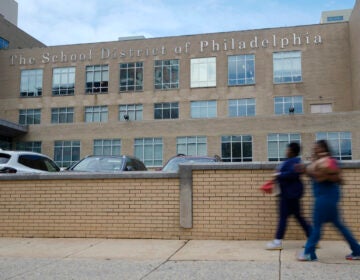Lessons from teachers — Becoming experts on food
Lisa Hantman’s 3rd grade classroom in McCall Elementary School in the Society Hill neighborhood gives away her passions: math, science, and service learning.
As a result of the big changes underway in the School District, teachers will soon be given more freedom to be creative. As part two in a five part series, the Notebook and NewsWorks took a multimedia look inside the classrooms of exemplary Philadelphia teachers to get an on-the-ground perspectives of great teaching.
Lisa Hantman’s 3rd grade classroom in McCall Elementary School in the Society Hill neighborhood gives away her passions: math, science, and service learning.
On a recent breezy afternoon, Hantman unveiled to the class the project that they would be studying over several weeks — how much does it cost to feed a family of four for a year.
Using PowerPoint, Hantman delivered a short lesson, asking students to recall what they had already learned about basic food groups and nutrition, how to add up the cost of food for one day, one week, one year; and how the scientific method works. She reminds them that 45,000 people visit soup kitchens in the city each week.
Then the students broke up into groups of four, with worksheets to guide them through the process of choosing foods and calculating costs.
The lesson meshed math with science with the class’s yearlong service learning project studying hunger and nutrition.
“I follow the standards, I use what is mandated, but I do it from within the realm of some very interesting things,” Hantman said. “We really become experts on things. The kids eat that kind of stuff up. They want to be smart; they want to tell the world what they know.”
The classroom teems with children’s photos, artwork, their charts, graphs and illustrations. At the back of the room, 700 cans of fruits, vegetables, and meat are sorted and stacked, waiting to be delivered to Philabundance food bank. And the walls abutting the doorway are virtually wallpapered with accolades from the District and community groups, attesting to past service learning projects, including the Smoke-Free Forever Museum that spilled out of the classroom into the hallway and drew 1,000 visitors three years ago.
Hantman has taught for more than three decades, the last eight years at McCall, and she gives credit to the nonprofit Need in Deed for reinvigorating her teaching. That group, headquartered in Chestnut Hill, trains and supports teachers in service learning. With two master’s degrees and a reading certification, she seems driven to improve her practice, and most recently has applied for National Board Certification to win master teacher status.
Her biggest challenge this year, she said, stems from class size, which expanded from 24 to 29 children. “It makes a huge difference. It’s five more souls I have to worry about and five more sets of needs,” she said. “If even one of those children has a difficult time in a regular setup, and I already have one or two, then we are adding to those children who are at risk for falling through the cracks.”
WHYY is your source for fact-based, in-depth journalism and information. As a nonprofit organization, we rely on financial support from readers like you. Please give today.




